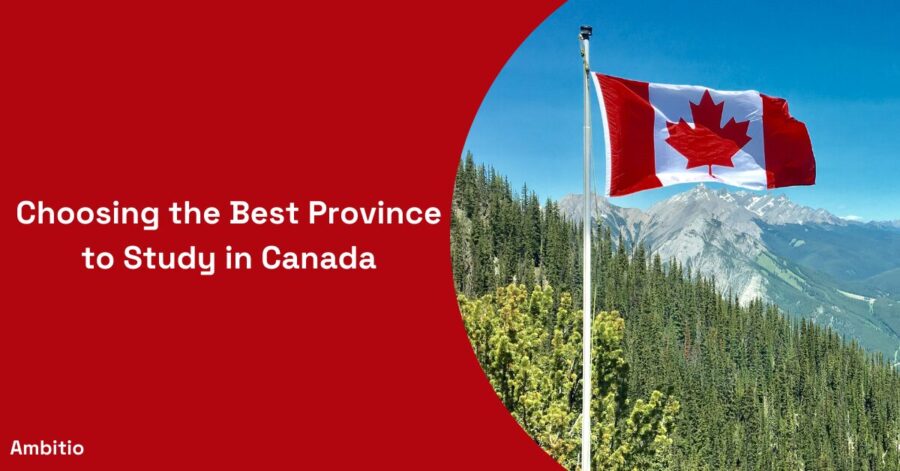13 December 2024
7 minutes read
Choosing the Best Province to Study in Canada

Canada has established itself as one of the top destinations for international students seeking a quality education. With a diverse range of provinces, each offering unique advantages, it can be challenging to decide which one is the best fit for you.
In this comprehensive guide, we’ll explore the factors that influence your choice of the best province to study in Canada. From top cities and universities to job opportunities and lifestyle, we’ve got you covered.
The Factors That Matter
Location of Universities
One of the first factors to consider when choosing a province in Canada is the location of universities. Different provinces house some of the country’s most prestigious institutions.
For instance, Ontario boasts world-class universities such as the University of Toronto and McGill University, located in the province of Quebec. Consider the specific universities that offer programs aligned with your academic and career goals.
Job Opportunities
Another essential factor is the availability of job opportunities while studying. Many international students depend on part-time work to support their living expenses. Provinces like British Columbia and Ontario, with their bustling urban centers, often provide more job opportunities, making it easier to balance work and study.
Cost of Living
The cost of living can vary significantly between provinces. Major cities like Toronto and Vancouver tend to have higher living costs, including accommodation and daily expenses. Smaller provinces might offer a more affordable lifestyle. It’s crucial to factor in your budget when deciding on the right province.
Field of Study
The province you choose should align with your field of study. Some provinces are known for their expertise in specific disciplines. For example, if you’re interested in technology and innovation, Ontario’s Silicon Valley North in the Greater Toronto Area might be an ideal choice. Similarly, Quebec is renowned for its strong focus on the arts and culture.
Cultural Diversity
Canada is celebrated for its multiculturalism. Provinces like British Columbia and Ontario are exceptionally diverse, offering a welcoming environment for students from all backgrounds. Consider the cultural diversity of a province, as it can impact your overall experience.
Popular Canadian Provinces for International Students
British Columbia: A Hub of Diversity and Opportunity
British Columbia, located on the west coast of Canada, is a province that attracts students from around the world. It’s home to the beautiful city of Vancouver, known for its stunning natural scenery and cultural vibrancy.
The University of British Columbia, one of the country’s top institutions, is located here. With a focus on tech and innovation, British Columbia offers ample job opportunities and a high quality of life.
Ontario: Where Academia Meets Industry
Ontario is Canada’s most populous province, home to iconic cities like Toronto. The province is a powerhouse of education and industry. The University of Toronto and several other esteemed institutions call Ontario home. Its diverse economy and extensive job market make it an attractive destination for students.
Quebec: A French-Canadian Experience
For those seeking a unique French-Canadian experience, Quebec is the place to be. The province is known for its rich culture, and the majority of its residents are French-speaking.
McGill University and the University of Montreal are renowned institutions in Quebec, offering world-class education. This province is ideal for those who want to immerse themselves in a distinct cultural experience.
Alberta: Nature and Education Combine
Alberta, located in the western part of Canada, offers a mix of stunning natural landscapes and academic excellence. The University of Alberta and the University of Calgary are prominent institutions in the province. Alberta is an excellent choice for those interested in fields related to agriculture, energy, and the environment.
Nova Scotia: Maritime Charm and Quality Education
Nova Scotia, on the Atlantic coast, combines maritime charm with top-tier education. The province’s Dalhousie University is highly regarded, and the cost of living here is relatively reasonable. Nova Scotia offers a close-knit community and an environment conducive to academic success.
Post-Graduation Opportunities
Working in Canada After Graduation
One of the significant advantages of studying in Canada is the opportunity to work in the country after graduation. International students who complete a program of study in Canada may be eligible for a Post-Graduation Work Permit (PGWP). This permit allows graduates to work in Canada and gain valuable work experience.
Pathways to Permanent Residency
Many international students aspire to become permanent residents in Canada. Fortunately, the country offers various pathways for international students to achieve this goal. Provinces such as Manitoba and British Columbia have Provincial Nominee Programs (PNPs) that make it easier for graduates to apply for permanent residency.
Studying and Working in Canada
Studying in Canada provides a unique opportunity to gain Canadian work experience. The country’s liberal policies allow students to work both during and after their studies, making it easier to transition from student life to the workforce.
Navigating the Application Process
Study Permit and Visa Application
To study in Canada, you’ll need to obtain a study permit, which is often part of the student visa application process. The study permit allows you to stay in Canada for the duration of your program. It’s essential to ensure that you meet all the requirements for the study permit and visa application to avoid any complications.
Admission Requirements
Admission requirements are a critical aspect of the process when you’re considering studying in Canada. Each university and province may have specific criteria that you need to meet to secure admission. In this section, we’ll delve into the various elements that make up these requirements.
Academic Transcripts
One of the primary admission requirements is your academic history. You’ll need to provide transcripts from your previous educational institutions. These transcripts should outline your academic performance, including grades, courses, and any degrees or certificates you’ve earned. Most Canadian universities will require you to submit both your original transcripts and certified translations if they are not in English or French.
Language Proficiency Tests
Proficiency in the English or French language is crucial for your success in a Canadian academic environment. To assess your language skills, you’ll often need to take standardized language proficiency tests.
The most common tests for English proficiency are the International English Language Testing System (IELTS) and the Test of English as a Foreign Language (TOEFL). For French proficiency, the Test de connaissance du français (TCF) is typically accepted.
Letters of Recommendation
Many universities in Canada request letters of recommendation as part of the admission process. These letters should be written by individuals who can vouch for your academic capabilities and character. Professors, teachers, or employers are often excellent choices for providing these references. Make sure to provide them with ample time to write compelling letters on your behalf.
Statement of Purpose or Personal Statement
In your application, you’ll likely be required to submit a statement of purpose or a personal statement. This is your opportunity to explain why you want to study in Canada, why you’ve chosen the specific program or course, and how it aligns with your career goals. A well-crafted statement can set you apart from other applicants.
Entrance Exams
Some programs or universities may require specific entrance exams. For instance, if you’re applying for a graduate program in the sciences, you might need to take the GRE (Graduate Record Examination).
Similarly, the GMAT (Graduate Management Admission Test) is often required for business and management programs. Be sure to check the specific requirements for your chosen program and university.
Portfolio (For Creative Programs)
If you’re applying for a program in the creative arts, such as fine arts or design, a portfolio of your work may be a key part of the application. Your portfolio should showcase your skills and creativity in the relevant field. Make sure to follow the specific guidelines provided by the university for portfolio submission.
Interview
In some cases, universities may conduct interviews as part of the admission process. This is more common for graduate and professional programs, such as law or medicine. Be prepared to discuss your academic and career aspirations, as well as why you’re a suitable candidate for the program.
Application Fee
Don’t forget that there is usually an application fee associated with applying to universities in Canada. The fee varies by institution and program. Ensure that you check the specific amount and payment methods required by the university you’re applying to. Fee waivers may be available for some applicants.
Deadlines
It’s essential to pay attention to application deadlines. Canadian universities typically have set deadlines for each intake, such as fall or spring. Missing these deadlines can result in your application not being considered, so ensure you submit your application well before the cutoff date.
Proof of Financial Support
International students are often required to demonstrate their ability to cover the cost of their studies and living expenses while in Canada. This may involve providing bank statements or letters of financial support from sponsors.
Conclusion
Choosing the best province to study in Canada is a crucial decision that will shape your educational and life experience. Consider factors like the location of universities, job opportunities, cost of living, and your field of study when making your choice.
Whether you opt for the cultural diversity of British Columbia, the academic prestige of Ontario, the French-Canadian experience of Quebec, the natural beauty of Alberta, or the maritime charm of Nova Scotia, Canada offers a wide range of options for international students.
Remember that studying in Canada also opens doors to post-graduation work opportunities and pathways to permanent residency. Navigating the application process for your study permit and university admission requires attention to detail and adherence to specific requirements.
In the end, your decision should align with your academic and career aspirations, ensuring that your time in Canada is not only educational but also enriching and fulfilling. So, take your time to explore your options and embark on an incredible educational journey in the Great White North.
FAQs
Q1: What factors should I consider when choosing a province to study in Canada?
When deciding on a province, consider factors like the location of universities, job opportunities, cost of living, and your field of study.
Q2: Are some provinces more popular among international students than others?
Yes, provinces like British Columbia, Ontario, and Quebec are popular due to their top universities and vibrant cities.
Q3: Which province in Canada is best for Indian students?
Many Indian students choose British Columbia and Ontario for their diverse communities and excellent academic institutions.
Q4: Can I work part-time while studying in Canada?
Yes, international students in Canada can work part-time during their studies, helping with living expenses.
Q5: How do I obtain a student visa for Canada?
To study in Canada, you’ll need to apply for a study permit, which is often part of the student visa application process.
Q6: Are there job opportunities for international students after graduation?
Yes, Canada offers post-graduation work permits that allow international students to work in Canada after completing their studies.
Q7: What makes British Columbia a popular province for international students?
British Columbia is known for its stunning natural beauty, multicultural cities like Vancouver, and top-notch universities.
Q8: What is the cost of living in Canadian provinces for international students?
The cost of living varies by province, but generally, cities like Toronto and Vancouver tend to be more expensive than others.
Q9: Can I apply for permanent residency in Canada after my studies?
Yes, Canada provides pathways to permanent residency for international students who have completed their studies.
Q10: Which province is considered the best for quality education in Canada?
Provinces like Ontario and Quebec are renowned for their high-quality education and top-ranked universities.

You can study at top universities worldwide!
Get expert tips and tricks to get into top universities with a free expert session.
Book Your Free 30-Minute Session Now! Book a call now




























